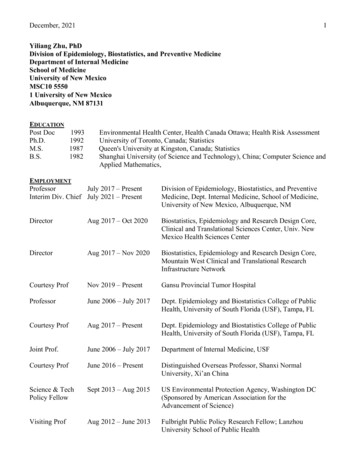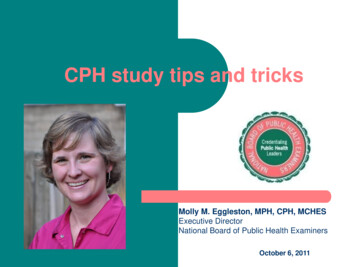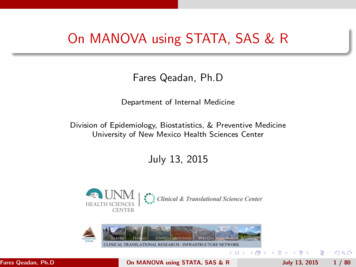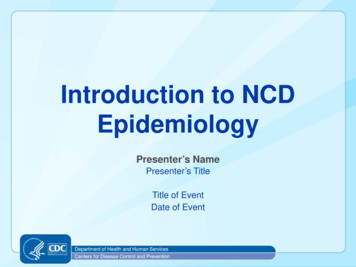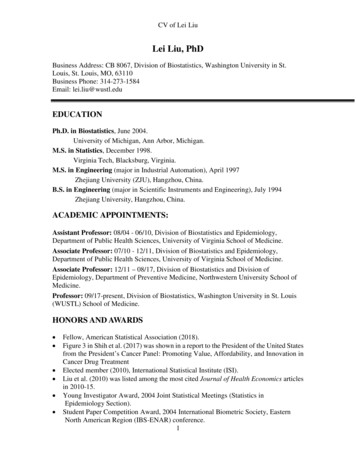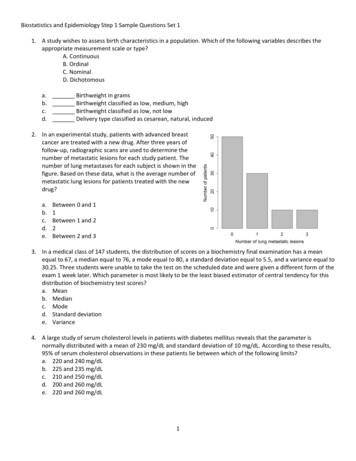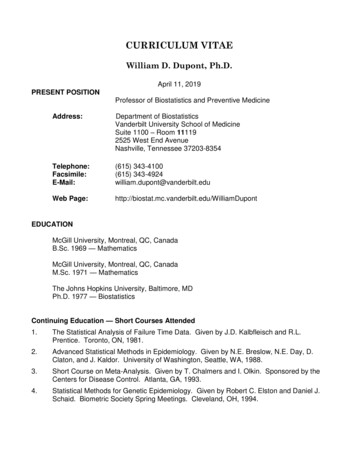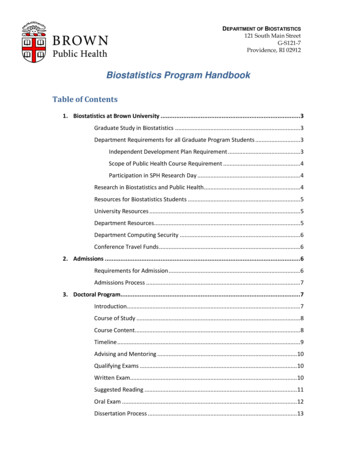
Transcription
Epidemiology and BiostatisticsEPIDEMIOLOGY ANDBIOSTATISTICSDepartment Website (http://www.sph.sc.edu/epid bios/default.htm)Anthony Alberg, ChairAchieving gains in improving the public’s health depends on the abilityto identify and solve community health problems. As measurement andresearch sciences, epidemiology and biostatistics are critical disciplinesfor the ascertainment and characterization of public health problems.and generating public health action. Combining epidemiology andbiostatistics in the same department creates synergies in educationand research. However, the two disciplines are unique and thus theDepartment is comprised of two divisions: the Division of Biostatisticsand the Division of Epidemiology.The Department of Epidemiology and Biostatistics offers the followingdegrees: Master of Public Health (M.P.H.) (Epidemiology only), Master ofScience (M.S.)*, and Doctor of Philosophy (Ph.D.).1development, and evaluation of health programs and problems.They collect and analyze various types of information; these includedemographic and vital statistics, social and business data, healthresources statistics, and other forms of social and economic datawhich are relevant to modern health problems. Biostatisticians designexperiments and observational studies, use various computer operatingsystems and software packages to store and analyze data, developmethods to compare population groups, and prepare inferential andprobabilistic statements based on biological, social, and environmentaldata. Biostatisticians are the theoretical researchers and appliedstatisticians of public health.Programs OverviewDoctoral and master’s students in programs in the Department ofEpidemiology and Biostatistics gain state-of-the-art knowledge andskills that empower them to function effectively and appropriatelyin identifying, evaluating, and solving public health problems. Uponcompletion of the program, the students demonstrate: knowledge base of the etiology of disease, disability, and other healthconditionsProgram in Epidemiology application of epidemiologic and biostatistical methods in identifyingthe determinants of disease, disability, and other health conditionsThe major in epidemiology is designed for students pursuing careersin the study of patterns of diseases, disabling conditions, and otherindicators of health in human populations. The field of epidemiologyinvolves the study of the distribution and determinant of health anddisease in human populations, and the application of this knowledge tobetter prevent and treat disease. Epidemiologists attempt to establishthe causes of disease by describing the biological, environmental,social, and behavioral factors affecting illness and premature death, aswell as factors that contribute to health and well-being. The evidencegenerated from epidemiologic research is translated into developinghealth promotion/disease prevention programs. and formulating healthpolicy. Being an effective epidemiologist requires skills in working ininterdisciplinary teams., both in leadership and collaborative roles,whether these teams. are focused on advancing research or public healthpractice. understanding of the design and conduct of research in public healthDepartmental faculty are actively involved in research projects fundedby the federal government and other sources. Faculty also contributetheir expertise to address public health challenges and contribute tohealth policy at the local, state, national, and global level. Our degreeprograms. are designed to help students achieve their career goals,whether the goals are an academic research career or a career in publichealth practice, and whether the preferred setting is in the public sectoror in the private sector (such as health systems., pharmaceutical industry,etc.)Master of Public Health (M.P.H.) in Epidemiology (43 Hours)Master’s DegreesOur Master of Public Health (M.P.H.) degree students learn in a multifaceted educational program; this includes an integrated core curriculum,epidemiologic and biostatistical methods, and experience and training ina public health practice setting.Master of Science (M.S.) in Epidemiology (43 Hours)The Master of Science (M.S.) degree is designed for those who wish toacquire skills necessary for doing public health or biomedical researchand want to focus on developing research skills for clinical researchor the study of determinants of disease and other health-relatedoutcomes. If you intend to further your study by pursuing a Ph.D. inEpidemiology, you will want to choose the M.S. rather than the M.P.H.degree.Program in BiostatisticsThe program in biostatistics is designed for individuals who wishto pursue careers in community health measurement, design andmanagement of health data systems, and the development andapplication of quantitative methods to health problems. Biostatisticiansapply statistical theory, methods, and techniques to the planning, skill in data management and analysis and interpretation ofresearch results in studies to describe the distribution of disease,determinants of disease, and clinical trials to advance diseaseprevention, screening, and treatment.EpidemiologyThe broad objective of the M.P.H. with a major in epidemiology isto prepare an individual to apply epidemiologic skills in a publichealth setting. The M.S. with a major in epidemiology focuses on thedevelopment of basic research skills for the study of correlates anddeterminants of disease and other health conditions. Students in bothM.P.H. and M.S. programs: develop an understanding of the integration of epidemiologicresearch methods into the principles and philosophy of public health develop knowledge of the basic epidemiology of commonly studieddiseases and other health conditions and health promoting behaviors describe the natural history, biology/pathophysiology, risk factors,methods unique to the specific situation, and strategies for diseaseprevention and control for several diseases or health conditions orhealth promoting behaviors apply descriptive and analytic epidemiologic methods to investigateand identify factors associated with various health conditions understand statistical procedures commonly used in public healthresearch and evaluation
2Epidemiology and Biostatistics develop expertise in computer applications and usage necessary forsuccessfully managing or conducting epidemiologic studies demonstrate ability to manage and summarize health-relateddata and statistics and to calculate and appropriately interpretassociations and their relevance to public health develop skills in presenting demographic, statistical, programmatic,and scientific data accurately and effectively for professional and layaudiences.In addition, the M.P.H. student will develop an understanding of concepts,methods of implementation, and evaluation of health surveillancesystems and demonstrate the ability to integrate epidemiologic conceptsand analytic approaches to the study of a specific health problem byworking with a mentor in a practice setting, preparing a written report,and giving an oral presentation to professionals who will be using theinformation generated. The M.S. student will demonstrate the ability tosynthesize the current state of knowledge of a specific problem, criticallyevaluate findings, develop appropriate research questions to advancethe field, and develop and implement a simple research protocol aimedat testing an epidemiologic hypothesis or estimating an effect of a riskfactor on a health outcome and report results in a form suitable fordissemination to the scientific community. Both the M.P.H. and the M.S.require a minimum of 43 hours.BiostatisticsThe broad objective of the M.S. with a major in biostatistics providesthe biostatistical concepts, principles, and skills necessary for scientificinquiry into health conditions and related methodologic developments.Students in both programs develop the capacity to: demonstrate the ability to evaluate a given health-related problemand to identify the most appropriate statistical technique for analysis display mastery of a variety of traditional and newly developedstatistical techniques, including multivariable methods forcontinuous and categorical data analysis demonstrate the ability to interpret the results of a statisticalanalysis and to communicate such interpretations in an easilycomprehendible manner demonstrate knowledge of academic and non-academic issues andproblems in epidemiology and biostatistics demonstrate the ability to structure available data in an easilyuseable form using a variety of data management software tools demonstrate the ability to use a variety of statistical softwarepackages, to create and maintain databases, and to analyze dataStudents in the M.S. program will demonstrate the ability to workindependently in a research problem outside of the classroom setting,and demonstrate the ability to modify and extend existing statisticaltechniques to answer questions posed by health related situations, andto synthesize such research results into acceptable research papers.Master of Public Health (M.P.H.) in Epidemiology (43 Hours)Our Master of Public Health (MPH) degree students learn in a multifaceted educational program; this includes an integrated core curriculum,epidemiologic and biostatistical methods, and experience and training ina public health practice setting. In Fall 2019, the Arnold School of PublicHealth will launch our exciting redesigned MPH programs integratedacross the public health disciplines. More details are available at here(http://sph.sc.edu/mph/).Master of Science (M.S.) in Epidemiology (43 Hours)The Master of Science (M.S.) degree is designed for those who wish toacquire skills necessary for doing public health or biomedical researchand want to focus on developing research skills for clinical researchor the study of determinants of disease and other health-relatedoutcomes. If you intend to further your study by pursuing a Ph.D. inEpidemiology, you will want to choose the M.S. rather than the M.P.H.degree.Master of Science (M.S.) in Biostatistics (54 Hours)The Master of Science (M.S.) degree in Biostatistics prepares studentsfor involvement in biostatistical research, including applying statisticaltheory to health problems, formulation of designed population andclinical intervention trials, and adapting existing statistical theory toaddress newly emerging health-related problems.Doctoral DegreesThe Doctor of Philosophy is an advanced graduate research degreedesigned for those who intend to pursue teaching and researchcareers. The major objective of the Ph.D. degree with a concentration inepidemiology is to prepare an individual to pursue original epidemiologicinvestigation of diseases of unknown etiology and other healthconditions or health behaviors and develop novel methodologicalapproaches. The major objective of the Ph.D. program with aconcentration in biostatistics is to prepare an individual to develop andapply biostatistical principles and methods to public health problems.Doctor of Philosophy (Ph.D) in Epidemiology (54 Hours)The Doctor of Philosophy (Ph.D.) is an advanced graduate degree forthose who intend to pursue teaching and research careers. The majorobjectives are to prepare you to:1. pursue original epidemiologic research,2. develop novel methodological approaches,3. teach epidemiologic methods courses, and4. consult with non-epidemiologists in a collaborative research setting.Doctor of Philosophy (Ph.D.) in Biostatistics (54 Hours)The Doctor of Philosophy (Ph.D.) degree in Biostatistics preparesstudents for involvement in teaching and independent and collaborativebiostatistical research; trains researchers to teach and to pursue originalresearch on analytical approaches to investigating health conditions; andto develop novel biostatistical approaches.Dual Ph.D. Degree Program in Epidemiology and EnvironmentalHealth SciencesThe Department of Epidemiology and Biostatistics and the Department ofEnvironmental Health Sciences jointly offer a dual Doctor of Philosophy(Ph.D.). Students explore the unique set of requirements in relationto study design, bias, measurement of environmental exposures,and measurement of environmental-related health outcomes. Thedual Ph.D. requires course work in epidemiology and environmentalhealth sciences selected by the student in consultation with a jointepidemiology/environmental health sciences advisory committee, andsuccessful completion of dissertation research on a topic spanning bothdisciplines. The successful applicant will have a faculty member in bothdepartments who has agreed to be his/her mentor, and he/she will havea research area of Interest for which we have faculty expertise in bothdepartments. Detailed program requirements for this highly competitive,rigorous dual degree program are available upon request.
Epidemiology and BiostatisticsProgram Requirements for Epidemiology DegreeProgramsunderstanding of the biological basis of public health are stronglyencouraged to select courses that will provide this understanding.A graduate student handbook and a list of specific courses needed tomeet these requirements are available in the department.Doctoral Admission RequirementsProgram Requirements for Biostatistics DegreeProgramsA graduate student handbook and a list of specific courses needed tomeet these requirements are available in the department.Department Admission RequirementsGeneral Admission Requirements for EpidemiologyAdmissions decisions are based on an evaluation of the applicants’entire file in relation to the pool of applicants that year. We also evaluatewhether the applicant’s needs and goals fit well with our department’sstrengths and resources. We review master’s degree applications once/year for fall matriculation, and we review doctoral student applicationstwice/year for fall and spring matriculation.Applicants for graduate degree programs in Epidemiology must meetall requirements of The Graduate School (https://www.sc.edu/study/colleges schools/public health/apply/graduate applicants/) foradmission and the Arnold School of Public Health (https://www.sc.edu/study/colleges schools/public health/apply/graduate applicants/). Allapplications are submitted through SOPHAS (http://www.sophas.org/),with the following required documents: Resume or CV Three letters of recommendation from academic and/or professionalsources Official transcripts from all schools or colleges previously attended GPA 3.0 or higher (4.0 scale) GRE scores 50% or higher for each: Verbal, Quantitative, AnalyticalWriting MCAT scores may not be substituted for GRE scores. The percentiles above are general guidelines not cut points. Personal statement describing your academic and research interestsand professional goals. Master’s applicants should discuss how they became interestedin epidemiology as a career choice. Doctoral applicants must discuss their research area of interestalong with the faculty member who has agreed to mentor them. Non-US institution transcripts must be verified by World EducationServices (WES) or equivalent service. Submit course-by-courseevaluation (WES ICAP). For those whose native language is not English, we require either aTOEFL (minimum 80) or IELTS (minimum 7.0) score.Masters Admission RequirementsThe Master of Public Health (M.P.H.) program and the Master of Science(M.S.)* program matriculate one cohort of students every fall. Admissionrequirements include a four-year baccalaureate degree or its equivalentfrom an accredited institution, preferably in the arts, sciences, ormedicine. Prior professional work experience is considered an asset butis not a requirementStudents admitted to either the M.P.H. or the M.S. program who donot have academic or professional experience that provides a strong3For the Doctor of Philosophy (Ph.D.) program, applicants must have amaster’s degree in public health from an approved school of public healthor related field or an equivalent advanced professional degree.Before an application is reviewed, students must find an epidemiologyfaculty member in their research area of interest who agrees to be theirmentor. This agreement should be mentioned in the personal statement.A holistic approach to application review process is utilized.Research experience and publications are not required; however, priorexperience is highly encouraged along with publications, including firstauthor.Admission Requirements for BiostatisticsApplicants for a graduate degree in Biostatistics must have a degree froman approved college or university. Applicants must meet all requirementsof The Graduate School for admission and be recommended to theGraduate School for acceptance by the Department of Epidemiology andBiostatistics.When we make our admissions decisions, we evaluate the applicant’sentire file in relation to the pool of applicants that year. We also evaluatewhether the applicant’s needs and goals fit well with our department’sstrengths and resources.The admission criteria for all degree programs follow those of TheGraduate School and the Arnold School of Public Health. Before you canbe considered for admission, you must submit an Online Applicationvia http://www.sophas.org. Your application must include: Completed Application submitted through SOPHAS — http://www.sophas.org At least two letters of recommendation for the MPH and MSPHprograms and at least three letters of recommendation for the PhDprogram An updated Résumé or CV Official transcripts for all undergraduate and graduate workpreviously undertaken Official copies of Graduate Record Examination (GRE) scores A personal statement that addresses research or practice interestsand long-term objectivesCandidates for all graduate programs in Biostatistics must demonstrateproficiency in communicating in English, working with mathematicalconcepts, and in thinking analytically. While we do not set absolutecut points for grade point average and GRE scores (in part because ofvariability in test-taking ability that may not reflect competence to dowell in the programs, and the fact that the percentile scores vary byyear) we value their ability to provide us with global comparative criteria.Therefore, we provide the following as a general guideline for all ourprograms: Grade point average of 3.0 GRE Verbal score 151 (International students whose GRE Verbalscore is 146, and whose TOEFL score is at least the minimumdefined below, will also be considered)
4Epidemiology and Biostatistics GRE Quantitative score 157 for the M.S. program and 161 for thePh.D. programCommittee members review the entire files carefully. Clear demonstrationof competence in one or more domain(s) can supersede specific GREscore(s)An electronic application packet should be submitted to SOPHAS as earlyas possible, and will not be processed until all the required credentialshave been received and verified. Electronic applications can be submittedonline. For information on how to apply electronically see the ArnoldSchool of Public Health’s admissions website.International applicants whose native language is not English andwho have not earned a degree in an English-speaking country are alsorequired to submit a satisfactory score on the Test of English as a ForeignLanguage (TOEFL) or the University of Cambridge’s International EnglishLanguage Testing System (IELTS) Academic Course Type 2 exam. Theminimum acceptable score on the TOEFL is 230 (computer-based) or570 (paper-based) or 75 (Internet-based). The minimum acceptableoverall band score on the IELTS Academic Course Type 2 exam is 6.5.Proficiency in English sufficient to undertake graduate study is expectedupon entry. Students who do not meet proficiency levels establishedby The Graduate School and the department will be expected to takeadditional work to raise their level of performance. Also, any transcriptfrom a non-US institution will need to be verified by World EducationServices (WES). WES is an organization that provides internationalcredential evaluation and checks documents for validity and accuracy.WES also offers an analysis of an individual’s degrees and transcripts andwill provide equivalents for each credential. For more information contactWES (http://www.wes.org/) or 212-219-7330.Masters Admission RequirementsDepartmental courses are sequenced so that students should begin theirprogram of study in the fall semester. However, applications for springadmission will be accepted.Applicants to the Master of Science (M.S.) program must have abaccalaureate degree in arts, science or medicine. Applicants shouldalso have completed with a B or greater Calculus-2 and Matrix or LinearAlgebra. Prior professional work experience is considered an asset but isnot a requirement.Students admitted to the M.S. program who do not have academicor professional experience that provides a strong understanding ofthe biological basis of public health are strongly encouraged to selectcourses that will provide this understanding.Doctoral Admission RequirementsDepartmental courses are sequenced so that students may begin theirprogram of study in the fall or spring semester. Applications for summeradmission will also be accepted.For the Doctor of Philosophy (Ph.D.) program, preference for admissionis given to applicants with breadth and depth of academic preparationin Biostatistics, Statistics, or a closely related field. Applicants musthave a master’s degree in one of these areas, or a master’s degree insome other field and experience in these areas. Applicants should alsohave completed with a B or greater Vector Calculus and Matrix or LinearAlgebra.Programs Biostatistics, M.P.H. h/) Biostatistics, M.S. ph/) Biostatistics, Ph.D. d/) Epidemiology, M.P.H. /) Epidemiology, M.S. h/) Epidemiology, Ph.D. /) Maternal and Child Health, Certificate alth-certificate/)CoursesBIOS 700 - Introduction to Biostatistics (3 Credits)Health-related statistical applications. Descriptive statistics, probability,confidence intervals, hypothesis testing, regression, correlation, ANOVA.May not be used as part of a degree program in epidemiology orbiostatistics. Three lecture hours and one laboratory hour per week.BIOS 701 - Concepts and Methods of Biostatistics (3 Credits)Descriptive and inferential statistical applications to public health.Probability, interval estimation, hypothesis testing, measures ofassociation. Three lecture hours and one laboratory hour per week.Intended for those who will be involved in research applications ofbiostatistics.BIOS 709 - Basic Software for Public Health (1 Credit)Working with public health data using statistical software. Effective waysto store, clean, merge, and format public health data for analysis.BIOS 710 - Effective Data Management for Public Health (3 Credits)Statistical data management techniques. Microcomputer applications,communication between microcomputers and mainframe, tape and diskstorage, access of large health-related databases.Prerequisite or Corequisite: BIOS 700.BIOS 711 - Introduction to R Programming (1 Credit)Students will learn the software program R for performing datamanagement. The course covers basic to advanced commands forproperly formatting output, merging data, working with functions,graphing, using programming loops for preparing data for analysis forpublic health data.BIOS 712 - Introduction to Stata Software (1 Credit)Students will learn the software program Stata for performing datamanagement. The course covers basic to advanced commands forproperly formatting output, merging data, working with functions,graphing, using programming loops for preparing data for analysis forpublic health data.BIOS 714 - Introduction to MS Access for Public Health (1 Credit)This course focuses the uses of Microsoft Access for data managementin public health. The course takes the student through building tables,forms, queries, reports and finishes with automated scripts for each ofuse with Access.
Epidemiology and BiostatisticsBIOS 719 - Advanced SAS Methods for Public Health (1 Credit)This course focuses on advanced programming for managing andanalyzing data using SAS. Building upon skills learned in BIOS 709(Introduction to SAS), students will learn data management using PROCSQL. Students will also become familiar with the SAS Macro Languagewhich prepares data for conducting efficient statistical analysis.BIOS 761 - Survival Analysis (3 Credits)Methods for the analysis of survival data in the biomedical setting.Underlying concepts; standard parametric and nonparametric methodsfor one or several samples; concomitant variables and the proportionalhazards model.Prerequisites: BIOS 757 or BIOS 758.BIOS 745 - Seminar in Biostatistics (1-2 Credits)Analysis of current and prospective issues in biostatistics, includinghistorical foundations. Includes student exploration of unsolvedproblems and examination of central issues in biostatistics.BIOS 762 - Biostatistical Modeling of Genomic Data (3 Credits)This course is an introduction to important topics and key conceptsin statistical genetics, with emphasis on statistics methods and theirapplications to human complex diseases. The course will cover majorconcepts and classical statistical methods for the analysis of family andpopulation based human genetic data.Prerequisites: BIOS 757 or equivalent.BIOS 746 - Introduction to Complex Survey Data Analysis (1 Credit)Students will learn the basics of data collection methods, samplingdesign for linear, logistic, and survival analysis complex models usingsurvey data. Students will also learn about weight adjustments,imputation methods with an emphasis on both applied models and thetheory behind them.Prerequisites: BIOS 701 and BIOS 709 or equivalent.BIOS 753 - Community Health Studies (3 Credits)Process, skills, and management of undertaking health studies in thehuman community.Prerequisites: BIOS 700, EPID 700.BIOS 754 - Discrete Data Analysis (3 Credits)Analysis of discrete data in public health studies. Relative risk, oddsratio, rates and proportions, contingency tables, logistic regression,introduction to other advanced topics. Not for biostatistics majors.Prerequisites: EPID 701, BIOS 710, BIOS 757.BIOS 755 - Introduction to Longitudinal Data Analysis (3 Credits)Introduction to principles and methods for longitudinal & multi-levelmodeling. Focus on data analysis and interpretation.Prerequisites: BIOS 757.BIOS 757 - Intermediate Biostatistics (3 Credits)Public health applications of correlation, regression, multiple regression,single and multi-factor analysis of variance and analysis of covariance.Prerequisites: a course in introductory statistics.BIOS 758 - Advanced Linear Models in Biostatistics (3 Credits)Public health applications of correlation, regression, multiple regression,single and multi-factor analysis of variance and analysis of covariance.Additional topics in analysis of health data including regressiondiagnostics, multi-collinearity of observational data, ridge/nonlinearregression, principal components, random/mixed effects, unbalanceddesigns, repeated measures and sampling and design effects.Prerequisites: BIOS 701.BIOS 759 - Theory and Methods of Discrete Data Analysis (3 Credits)The concepts, principles, and biostatistical techniques necessary toanalyze categorical epidemiological data including dose responsecurves, life tables, and discrete measures of association. Estimationof parameters for logistic and other commonly used epidemiologicalmodels.Prerequisites: EPID 701, BIOS 757.BIOS 760 - Biostatistical Methods in Clinical Trials (3 Credits)The basic and advanced statistical techniques necessary for the design,conduct, analysis, and interpretation of results of clinical trials.Prerequisites: EPID 741, BIOS 757.5BIOS 765 - Research Design in the Biomedical Sciences (3 Credits)Fundamentals of constructing, analyzing, and interpreting biomedicalstudies; internal and external validity, sample size determination,completely random designs, blocking crossover designs, factorialdesigns, confounding, nested designs, repeated measure designs.Prerequisites: EPID 741, BIOS 757.BIOS 770 - Applied Longitudinal Data Analysis (3 Credits)Modern methods for the analysis of repeated measures, correlatedoutcomes, and longitudinal data, including repeated measures ANOVA,generalized linear models, random effects, and generalized estimatingequations.Prerequisites: BIOS 757 or STAT 701 or STAT 705.Cross-listed course: STAT 771BIOS 775 - Biostatistical Aspects of Bioinformatics (3 Credits)Bioinformatics analyses related to public health and biomedical research.Gene-gene and gene-environment interaction, phylogeny analysis indisease classification, and clustering for expression data. Data analyses,simulation studies, algorithms, and interpretation of health data.Prerequisites: BIOS 757.BIOS 780 - Introduction to Quantile Regression (3 Credits)Principles and methods of quantile regression, a robust and distributionfree statistical approach that extends the classical mean regression tothe analysis of complex treatment effects.Prerequisites: BIOS 757.BIOS 790 - Independent Study (1-6 Credits)Directed research on a topic to be developed by M.P.H. or M.S.P.H.student and instructor. May be repeated.
Master of Science (M.S.) in Biostatistics (54 Hours) The Master of Science (M.S.) degree in Biostatistics prepares students for involvement in biostatistical research, including applying statistical theory to health problems, formulation of designed population and clinical intervention trials, and adapting existing statistical theory to
